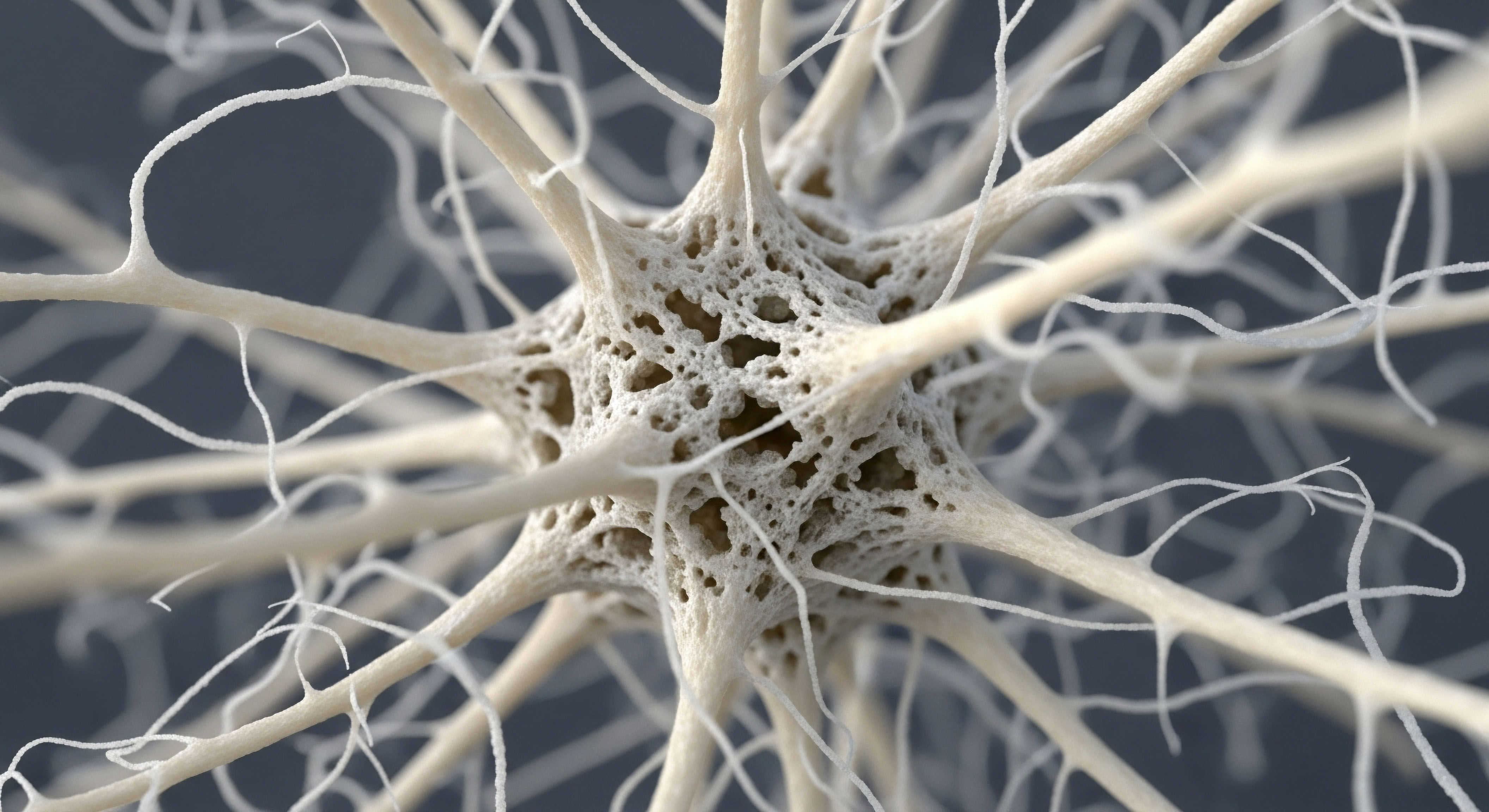

Your Physical State Governs Your Mental Acuity
The prevailing view of intellect is one of a disembodied command center, a brain floating in the ether of pure thought. This model is fundamentally flawed. Your cognitive capacity, the very speed and clarity of your thoughts, is a direct output of your body’s systemic health.
The brain is not a privileged operator separate from the biological machinery; it is the most demanding consumer of the resources that machinery provides. To treat your intellect as independent of your physiology is to willingly operate a supercomputer on a failing power grid.
Every biological process is interconnected. Hormonal balance, metabolic efficiency, and physical conditioning are the foundational pillars supporting neuronal function. An uncalibrated system creates downstream consequences. Mental fog, lagging recall, and diminished executive function are not moral failings or fixed traits; they are symptoms of a suboptimal biological environment. The body dictates the operational ceiling of the mind.

The Neurotrophic Command Line
The connection between physical exertion and mental sharpness is coded at the molecular level. Vigorous exercise triggers the expression of Brain-Derived Neurotrophic Factor (BDNF), a protein that acts as a potent fertilizer for your neurons. BDNF supports the survival of existing neurons, encourages the growth of new ones (neurogenesis), and fosters synaptic plasticity ∞ the brain’s ability to form and reorganize connections.
This process is most pronounced in the hippocampus, the brain region central to memory and learning. Engaging the body’s muscular and cardiovascular systems directly initiates a cascade that upgrades the brain’s hardware.
Six minutes of high-intensity exercise can increase every metric of BDNF by 4- to 5-fold more than prolonged, lower-intensity exercise.

The Endocrine Signal
Your hormonal state is a primary driver of cognitive performance. Testosterone, for example, has profound neuroprotective effects and modulates functions far beyond the physical. It influences key areas of the brain, enhancing synaptic plasticity and promoting the production of acetylcholine, a neurotransmitter critical for learning and memory.
Men with optimized testosterone levels often report heightened focus, improved spatial cognition, and a dissolution of mental fog. This is a clear demonstration of the endocrine system directly tuning the processing power of the central nervous system.


Engineering the Biological Substrate
To sharpen the intellect, you must first engineer the body. This is a systematic process of providing the precise inputs required to produce the desired cognitive outputs. It involves a multi-domain approach that treats the body as an integrated system, where each component influences the performance of the whole. The goal is to create an internal environment that fosters peak neuronal health and efficiency.
This is achieved through targeted interventions in physical conditioning, metabolic regulation, and gut-brain communication. Each protocol is designed to address a specific biological pathway that governs mental performance. The process is deliberate, data-driven, and designed for measurable results.

Protocol for Physical Calibration
The objective is to maximize the production of neurotrophic factors and optimize hormonal balance. The physical protocol must be structured for this specific outcome.
- High-Intensity Interval Training (HIIT): Short bursts of maximal effort are exceptionally effective at increasing BDNF. This form of training creates a potent hormetic stress that signals the brain to reinforce its own infrastructure.
- Resistance Training: Lifting heavy loads stimulates a significant hormonal response, including testosterone and growth hormone, which have direct and indirect cognitive benefits. It also improves insulin sensitivity, a key factor in metabolic health.
- Zone 2 Aerobic Exercise: Sustained, low-intensity cardiovascular work enhances mitochondrial function throughout the body, including the brain. Efficient mitochondria provide the clean, consistent energy supply that high-level cognition demands.

Metabolic and Gut-Brain System Tuning
The brain consumes a disproportionate amount of the body’s energy. Poor metabolic health, characterized by insulin resistance, directly impairs the brain’s ability to utilize glucose, its primary fuel. This leads to energy deficits that manifest as cognitive decline. Furthermore, the gut microbiome functions as a chemical signaling factory, communicating directly with the brain via the vagus nerve and producing neuroactive compounds that influence mood and clarity.
| System | Objective | Key Interventions | Cognitive Impact |
|---|---|---|---|
| Metabolic System | Improve Insulin Sensitivity | Nutrient timing; reduced intake of processed carbohydrates; monitoring blood glucose. | Stable brain energy supply; reduced neuroinflammation. |
| Gut-Brain Axis | Enhance Microbiome Diversity | Consumption of prebiotic fibers and fermented foods; elimination of inflammatory agents. | Modulation of neurotransmitters; improved immune response; reduced systemic inflammation. |


The Immediacy of Biological Debt
The degradation of cognitive function due to physiological neglect is not a distant eventuality. It is a continuous process. Every day that the body operates in a suboptimal state, biological debt accrues, and the brain’s performance is compromised. Impairments to glucose metabolism in the brain can begin between ages 40-65 in healthy adults, and often earlier. The choice is between proactive system management and reactive damage control.
The effects of intervention are observable across multiple time scales. Acute hormonal and neurochemical shifts occur within hours of a targeted exercise session. Systemic changes in metabolic health and inflammation can be measured in weeks. The structural remodeling of the brain through neurogenesis and enhanced synaptic density is a process that unfolds over months of consistent protocol adherence.

Short-Term Neurological Response
Within minutes of initiating high-intensity exercise, the brain increases its uptake of glucose and releases neurotransmitters like dopamine and norepinephrine, enhancing focus and alertness. The post-exercise surge in BDNF begins to fortify neural pathways almost immediately. These are tangible, same-day upgrades to your cognitive state.

Long-Term Structural Adaptation
Consistent application of these principles compounds over time. After six months of regular, structured exercise, older adults have demonstrated measurable increases in hippocampal volume ∞ the literal reversal of age-related brain atrophy. This is not merely slowing decline; it is the rebuilding of the physical structures responsible for memory.
Similarly, sustained metabolic health is directly linked to lower markers of vascular brain damage and greater grey matter volume. The intellect is sharpened because the organ that produces it has been systematically upgraded.
Globally, one in four adults lives with metabolic syndrome, a condition directly associated with a reduction in brain volume and worse cognitive performance.

Your Mind Is Forged in Your Muscle
The separation of mind and body is a fiction that has limited human potential for centuries. Your intellect is not an abstract quality; it is an emergent property of your physical self. The sharpness of your focus, the speed of your recall, and the creativity of your problem-solving are all outputs of a biological system.
To neglect the body is to starve the mind. True cognitive enhancement is achieved not through esoteric mental exercises, but through the rigorous, intelligent engineering of your own physiology. The ultimate tool for sharpening your intellect is your own body, optimized.



